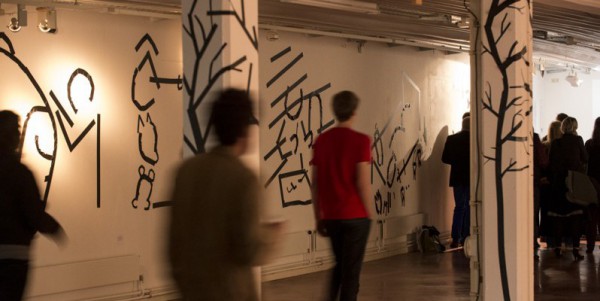On April 10, 2014, during the opening night of several solo exhibitions, Kinga Tóth presented a group performance with Solitude fellows at the Akademie with installation, sound and video based on her poetry book ZSÚR (2013). During her university studies and her practical work in the fields of psychology and pedagogy, the philologist and teacher of German language and literature analyzed children’s drawings and their power to identify the family system. Kinga uses the forms and methods of children to express themselves in her poems and drawings and tells us dark stories about fears, abuse and dominancy.
Clara Herrmann: The Party Performance at the opening showed six people sitting around a table, it’s a party, in a house, somewhere in the forest. No one moves. We hear sounds and voices telling stories, children’s rhymes, silent, loud, singing … what are the texts about?
Kinga Tóth: The performance presents a family dinner, a party, where you can move, talk – only if you have the permission for it. There is an order even in the placement, your seat shows your role, your borders. The movements follow the rules, the repetitive activities refer to the magic numbers of the tales, superstitions, but they won’t bring peace and calmness, they are meaningless. The texts tell a story of a country or a family, a system, where rules are changing, where you never know, whether you are in or out, whether you have power or not, whether you are aggressor or victim, where it is a risk to talk, to use the language, but where silence is dangerous as well.
CH: You call your book ZSÚR, published in Hungary last year, a »fake children rhyme book.« Can you tell us some more about the book and its content?
KT: It is a CD-shaped book with translated, adapted, written rhymes and my illustrations, which refer to Hungarian, German and English children’s rhymes at first sight, but contain sharp and serious social and political problems such as domestic violence, aggression, poverty, racism, LGBT, tradition and rules and education. The book plays with the »lack:« lack of contours, lack of words or definitions, lack of security and safety. Such a »condition« is, in my view, very characteristic for our daily life, our relations, relationships, language.
CH: On the walls of the exhibition space »Unterer Hirschgang« at Akademie Schloss Solitude visitors can find your large-scale black tape »drawings.« They strongly remind the spectator of children’s drawings. In which way did your research in the fields of psychology and pedagogy influence your work?
KT: The drawings might be similar to children’s drawings, especially the shapes, body parts, size of the figures, their placement. During my university studies and my practical work in the fields of psychology and pedagogy, I analyzed children’s drawings and their power to identify the family system, rules, traditions, roles and problems as well. The children’s drawings tell us something about the relations inside the family. They show abuse, dominancy, maltreatment. I used the forms, the ways and methods, which children use to formulate their way of thinking, for my illustrations, for the installation and of course in the pictures as well. The poems on the wall are placed close to the ground, on purpose. If the reader wants to read them, he/she has to squat, in order to see all the drawings from a child’s perspective, which gives another meaning to the poems, too.
CH: You also show a short movie at the exhibition. What was your inspiration here?
KT: The movie visualizes poem 56. Hut in the wood. Its origin is a small song about a rabbit, who seeks refuge from the hunter and finds a warm place in an old man’s house close to the fire. This movie points to this story from another perspective, the warm place, the house, the fire, trust in a stranger, who prepares fire for the bunny. It could be a silly song, but its real topic is the danger, danger outside and inside as well. The movie is a music video poem with Gergely Molnar, musician and visual artist, besides thematising a poem, it refers to the whole book, tradition, meeting, sacrificing, unsecurity.
56. hut in the woods
human in the hut
rabbit at the window
farmer at the door
wants to strike
don´t shiver
fire is warm
inside
(poem 56., adapted by Rob Santaguida and Kinga Tóth)
